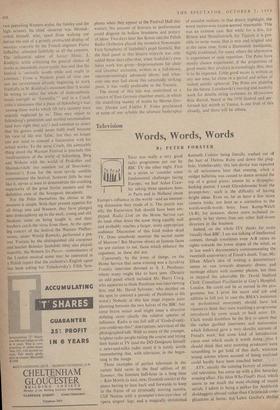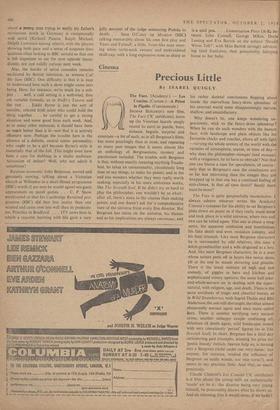Television
Words, Words, Words
By PETER FORSTER
THAT was really a very good radio programme put out by BBC TV the other night. First in a series to 'consider some fundamental challenges facing Europe,' we had Aidan Craw- ley asking three speakers here, in Paris and in Holland about Eurbpe's influence in the world—and an interest- ing discussion they made of it. The puzzle was why the Eurovision link should have been em- ployed. Radio Link on the Home Service can do (and often does) the same thing equally well and probably reaches a larger, more appropriate audience. Discussion of this kind makes dead TV. Does somebody murmur the sacred name of Murrow? But Murrow shows us famous faces we are curious to see, faces which enhance the argument, as these did not.
Conversely, by the irony of things, on the Home Service that same evening was a Speaking Frankly interview devoted to S. J. Perelman. whom many might like to have seen. (Despite an odd panel which included Mr. Harry Craig. who appeared to think Perelman was interviewing him, and Mr. David Sylvester, who decided on the spot to concoct a parody of Perelman at his worst.) Nobody at this late stage expects joint planning between the two halves of the BBC, but some brave senior soul might issue a directive defining more clearly the relative spheres of influence. Radio is too full still of 'Gosh-if-only- you-could-see-this !' descriptions, television of the photographed talk. With so many of the younger, brighter radio people taking the course and trying their hands at TV (and the DG-Designate himself a news-and-talks radio man) it is surely worth remembering that, with television, in the begin- ning is the image.
Three examples of perfect television in the variety field came in the final edition of Hi Summer, the funniest half-hour in a long time —Ken Morris (a nice, new, Goonish comic) at the piano having to lean back and forwards to keep in the frame of an erratically moving camera, Cliff Norton with a prompter's-box-eye-view of opera singers' legs, and a magically diminished Kenneth Connor being literally washed out of the hair of Thelma Ruby and down the plug- hole. Unbelievably, this last device was repeated in all seriousness later that evening, when a midget ballerina was caused to dance around the top of a grand piano, unseen by a dyspeptic- looking pianist. I await Glyndebourne from the prompt-box : such is the difficulty of having bright ideas. Even so, let us have a few more camera tricks, not least as a corrective to the words-words-words boys. Joan Kemp-Welch (A-R), for instance, shows more technical in- genuity in her shows than any other half-dozen directors in the business.
Indeed, on the whole ITV thinks far more visually than BBC. I am not talking of intellectual content, though sometimes even A-R raises its sights towards the lower slopes of the mind, as in last week's documentary commemorating the twentieth anniversary of Freud's death. True, Mr. Elkan Allan's idea of writing a documentary seems to run towards dramatic drums and montage effects with monster photos, but then in stepped the admirable Dr. David Stafford Clark. Consultant Psychiatrist at Guy's Hospital, London. He could not be so named in the pro- gramme, but I print his name and job and address in full just in case the BMA's insistence on professional anonymity should have led viewers to think they were watching a programme introduced by some quack or hack actor. Dr. Clark would doubtless be the first to admit that The rather garbled interviews and testimonies which followed gave a very sketchy account of Freud's work, but some kind of introduction came over which made it worth doing. Also I should think that next morning producers were scrambling to get hold of that dark, winsome young actress whose account of being analysed could hardly have been couched better.
ATV, usually the canning factory of commer- cial television, has come up with a live Saturday evening affair, The Man Who Finally Died, which seems to me much the most ekciting of recent serials. I admit to being a sucker for Amblerish skulduggery abroad rather than Christie-ish com- plications at home, but Lewis Greifer's thriller about a young man trying to verify his father's mysterious death in Germany is exceptionally well acted (Richard Pascoe,, Ralph Michael, Delphi Lawrence among others), with the players showing both pace and a sense of suspense (two -qualities often lacking in BBC serials) so that one is left impatient to see the next episode imme- diately, not just mildly curious next week.
Alas, the hurdle of serial comedies remains uncleared by British television, as witness Call Me Sam (BBC). One difficulty is that it is easy to understand how such a show might come into being. Here, for instance, we're stuck for a sub- ject . . . well, a café setting is a well-tried, firm yet variable formula, as in Dully's Tavern and the rest . . . Eddie Byrne is just the sort of amiable, relaxed Irish actor who could hold the thing together . . . be careful to get a strong situation and some good lines each week. And, • as in many other instances, it should have been so much better than it is—not that it is actively offensive now. Perhaps the trouble here is the absence of a definite, central comic personality, who ought to be a girl because Byrne's style is essentially that of the foil. This might even have been a case for dubbing in a studio audience. Admission of defeat? Well, why not admit it sometimes?
Random moments: John Betjeman, moved and genuinely moving, talking about a Victorian church at Willesden in a short filmed programme (BBC) worth (I am sure he would agree) ten guest appearances on panel games. . . . C. P. Snow misdirected so that his Cambridge Revisited pro- gramme (BBC) did him less justice than one wanted and came over less well than its predeces- sor, Priestley in Bradford. . . . ITV news item in which a reporter bursting with life gave a very
jolly account of the judge sentencing Podola to death. . . . Sean O'Casey on Monitor (BBC) talking memorably about his own first play and Yeats and Falstaff; a little, Joxer-like man wear- ing white turtle-neck sweater and embroidered skull-cap, with a long expressive nose as sharp as
is a quill pea. . . . Conversation Piece (A-R) be- tween John Connell, George Mikes, Doris Lessing and Eva Bartok on the subject 'Should Wives Tell?', with Miss Bartok strongly advocat- ing total frankness, then presumably hurrying home to her baby.







































 Previous page
Previous page